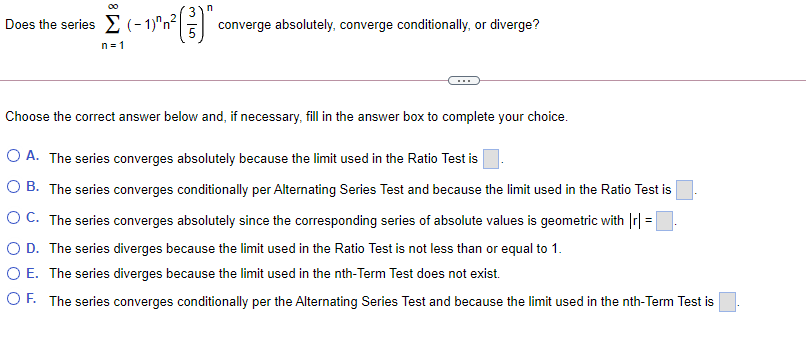Does the series (- 1)"n²| =| 3 converge absolutely, converge conditionally, or diverge? n= 1 Choose the correct answer below and, if necessary, fill in the answer box to complete your choice. O A. The series converges absolutely because the limit used in the Ratio Test is O B. The series converges conditionally per Alternating Series Test and because the limit used in the Ratio Test is OC. The series converges absolutely since the corresponding series of absolute values is geometric with Ir| =. O D. The series diverges because the limit used in the Ratio Test is not less than or equal to 1. O E. The series diverges because the limit used in the nth-Term Test does not exist. OF. The series converges conditionally per the Alternating Series Test and because the limit used in the nth-Term Test is
Does the series (- 1)"n²| =| 3 converge absolutely, converge conditionally, or diverge? n= 1 Choose the correct answer below and, if necessary, fill in the answer box to complete your choice. O A. The series converges absolutely because the limit used in the Ratio Test is O B. The series converges conditionally per Alternating Series Test and because the limit used in the Ratio Test is OC. The series converges absolutely since the corresponding series of absolute values is geometric with Ir| =. O D. The series diverges because the limit used in the Ratio Test is not less than or equal to 1. O E. The series diverges because the limit used in the nth-Term Test does not exist. OF. The series converges conditionally per the Alternating Series Test and because the limit used in the nth-Term Test is
Calculus: Early Transcendentals
8th Edition
ISBN:9781285741550
Author:James Stewart
Publisher:James Stewart
Chapter1: Functions And Models
Section: Chapter Questions
Problem 1RCC: (a) What is a function? What are its domain and range? (b) What is the graph of a function? (c) How...
Related questions
Question

Transcribed Image Text:Does the series E (-1)'n E":
converge absolutely, converge conditionally, or diverge?
n= 1
Choose the correct answer below and, if necessary, fill in the answer box to complete your choice.
O A. The series converges absolutely because the limit used in the Ratio Test is
O B. The series converges conditionally per Alternating Series Test and because the limit used in the Ratio Test is
OC. The series converges absolutely since the corresponding series of absolute values is geometric with Ir| =
O D. The series diverges because the limit used in the Ratio Test is not less than or equal to 1.
O E. The series diverges because the limit used in the nth-Term Test does not exist.
%3D
OF. The series converges conditionally per the Alternating Series Test and because the limit used in the nth-Term Test is
Expert Solution
This question has been solved!
Explore an expertly crafted, step-by-step solution for a thorough understanding of key concepts.
This is a popular solution!
Trending now
This is a popular solution!
Step by step
Solved in 3 steps with 2 images

Recommended textbooks for you

Calculus: Early Transcendentals
Calculus
ISBN:
9781285741550
Author:
James Stewart
Publisher:
Cengage Learning

Thomas' Calculus (14th Edition)
Calculus
ISBN:
9780134438986
Author:
Joel R. Hass, Christopher E. Heil, Maurice D. Weir
Publisher:
PEARSON

Calculus: Early Transcendentals (3rd Edition)
Calculus
ISBN:
9780134763644
Author:
William L. Briggs, Lyle Cochran, Bernard Gillett, Eric Schulz
Publisher:
PEARSON

Calculus: Early Transcendentals
Calculus
ISBN:
9781285741550
Author:
James Stewart
Publisher:
Cengage Learning

Thomas' Calculus (14th Edition)
Calculus
ISBN:
9780134438986
Author:
Joel R. Hass, Christopher E. Heil, Maurice D. Weir
Publisher:
PEARSON

Calculus: Early Transcendentals (3rd Edition)
Calculus
ISBN:
9780134763644
Author:
William L. Briggs, Lyle Cochran, Bernard Gillett, Eric Schulz
Publisher:
PEARSON

Calculus: Early Transcendentals
Calculus
ISBN:
9781319050740
Author:
Jon Rogawski, Colin Adams, Robert Franzosa
Publisher:
W. H. Freeman


Calculus: Early Transcendental Functions
Calculus
ISBN:
9781337552516
Author:
Ron Larson, Bruce H. Edwards
Publisher:
Cengage Learning